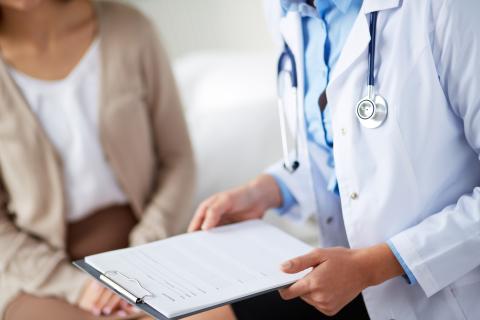Refugee Health Program: Medical Screening
Refugee medical screening is a thorough physical exam.
It includes a full screening for diseases that can be spread from person to person.
The purpose of the screening is to:
- Follow up on any medical issues found in the refugee’s overseas medical screening.
- Prevent the spread of diseases that can be passed from person to person.
- Find and treat health conditions that could keep a refugee from successfully resettling.
- Connect refugees with a doctor for ongoing health care.
See the complete Wisconsin Refugee Medical Screening Guidelines (PDF). Questions? Contact the Refugee Health Program at Savitri.Tsering1@wisconsin.gov.
You can get a refugee medical screening if you are identified as a/an:
- Refugee.
- Asylee.
- Cuban/Haitian entrant.
- Victim of trafficking.
- Amerasian.
- Afghan or Ukrainian humanitarian parolee.
- Special Immigrant Visa holder.
Clinics work with the resettlement agencies to plan clinic visits. Clinicians do the screenings. They are familiar with the screening process, culturally informed care, and working with interpreters.
Resettlement agencies work with clinics in their area. They schedule the first refugee medical screening and follow-up care.
The refugee medical screening should be a total health assessment. At a minimum, it should include:
- A general medical exam including:
- Health history and physical examination.
- Immunization review and update.
- Reproductive assessment.
- Nutrition and growth assessment.
- Dental, vision, and hearing exams.
- General lab testing including:
- A complete blood count with differential and platelets.
- Urinalysis.
- Blood glucose test.
- Cholesterol levels for adults.
- Metabolic panel for infants.
- Mental health screening.
- Infectious disease and environmental health screenings, including:
- Lead testing (in children 6 months to 16 years of age).
- Malaria screening (if history or symptoms warrant).
- Intestinal parasites screening and/or precautionary treatment.
- Sexually transmitted diseases screening, including:
- Hepatitis B screening and vaccination.
- Hepatitis C screening (if indicated).
- HIV infection screening.
- Syphilis.
- Chlamydia.
- Gonorrhea.
View the complete Refugee Medical Screening Guidance for Wisconsin Providers (PDF) (in accordance with the CDC’s (Centers for Disease Control and Prevention) Guidance for the U.S. Domestic Medical Examination for Newly Arriving Refugees).
Questions? Contact the Refugee Health Program at Savitri.Tsering1@wisconsin.gov.
Refugees have many unique health concerns upon and after arrival. Special attention should be given to providing trauma-informed care, oral health, and screening for communicable diseases, which are not commonly seen in U.S.-born patients. A complete list can be found in the Refugee Medical Screening Guidance for Wisconsin Providers (PDF)
Providers are also encouraged to use CareRef. This is a tool that provides clinicians with individualized guidance on refugee medical screenings based on:
- Current screening guidance from the CDC.
- Demographic and geographic factors.
- The specialized needs of refugee populations.
More resources
Newcomer Health Sessions by Colorado's Extension for Community Health Outcomes: Sessions designed to increase primary care providers' knowledge of health issues in newcomers, including refugee, immigrant and migrant (RIM) populations. Sign up required.
Domestic Medical Screening Guidelines Checklist (Word) —Office of Refugee Resettlement’s checklist for medical screening of both children and adults.
TB: Class B Arrivals—Wisconsin TB (Tuberculosis) Program’s webpage on TB arrivals with resources for testing and follow-up.
Clinical Assessment for Refugees—A tool for clinicians with screening information based on the most current guidelines.
Introduction Community Conversations: An Introduction to Female Genital Cutting (FGC)—A video by BRYCS' Community Conversations project that discusses the cultural roots, health consequences, and risk factors of FGC:
- Introduction Community Conversations: An Introduction to FGC Video
- Introduction Community Conversations: An Introduction to FGC PowerPoint (PDF)
Catholic Charities Milwaukee Educational Videos:
- Lead poisoning and prevention videos that explain lead poisoning, how lead poisons, and prevention methods to protect yourself and your family:
- Weekly and monthly kitchen cleaning routine videos explain how to build a weekly and monthly cleaning routine to maintain a clean kitchen:
- Communicating in emergencies videos share information about how to communicate in emergencies, including how to call 911, basic phrases in English, and what questions to expect:
- Find a Civil Surgeon (for adjustment of status / green card applications after refugee medical screening): USCIS Civil Surgeon Search
Who to contact for help
Questions?
- Email DHSWITBProgram@dhs.wisconsin.gov
- Call 608-261-6319
- Fax 608-266-0049


